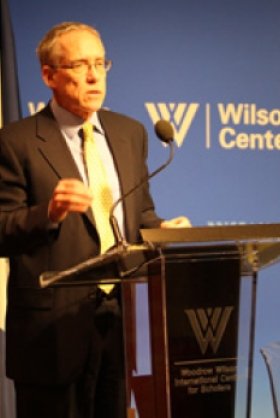Mr. Putin: Operative in the Kremlin


President Vladimir Putin has made it his mission “to save the Russian State,” according to his “Millennium Message” published on New Year’s Eve in 2000, said Clifford G. Gaddy, Senior Fellow of the Center on the United States and Europe, Brookings Institution. Presenting his book co-authored by Fiona Hill, Mr. Putin: Operative in the Kremlin, at an 18 March 2013 lecture at the Kennan Institute, Gaddy described the many dimensions of Putin’s character crucial to understanding Russia’s president as he starts his third term in office.
In order to understand what Putin’s goals are and how he expects to achieve them, we must consider where his ideas and his outlook came from, said Gaddy. Putin’s personal experiences may be the most significant factor in the development of his identity. For example, Putin was raised in post-war Leningrad, where his family and neighbors survived the Nazi siege. Another formative period was Putin’s career in the KGB under Yuri Andropov. Putin’s posting in Dresden, East Germany, which kept him outside of Russia during perestroika and the fall of the Soviet Union, was especially important, Gaddy said. All these experiences have contributed to the fabric of Putin’s identity.
Gaddy identified six layers to Putin’s identity: the “Statist,” the “Survivalist,” the “Man of History,” the “Outsider,” the Free Marketeer,” and the “Case Officer.” According to Gaddy, the first three form the basis for his goals and priorities, while the last three explain his methods for achieving those goals. While the first three identities are shared with many Russians, especially those of Putin’s generation, the last three are what make Putin unique.
Putin’s identity as the “Statist” reflects his view that “Russia must be a strong state and have a strong state apparatus.” This core value solidified during his career in the KGB, and underpins his belief that Russia must protect its status as a great power. Putin’s “Survivalist” identity is shared by many Russians who grew up in post-war Russia, particularly in Leningrad. It underscores his high prioritization of trust and the formation of close circles of friends and contacts. It further reflects Putin’s commitment to risk aversion and the strategic planning necessary to prepare for contingencies. Putin’s economic policies, especially his macro-fiscal policies, such as paying off foreign debt and building up financial reserves, exemplify this survivalist identity. Putin’s pursuit of policies that seem intended to thwart U.S. foreign policy goals may be also credibly interpreted not as an end, but as a means to accomplishing his real priority: “the literal survival of the Russian state.”
Putin as the “Man of History” emphasizes his efforts to incorporate the lessons of history, as he sees them, into policy. It also explains his efforts to revise and control historical interpretation for the state purposes. Putin’s recent efforts to resurrect czarist-era historic societies is an attempt to bridge the divisions that were created by history in Russia and Russian society between its cultures and identities in order to create the perception that “we are one history, we are one people.”
Putin’s identity as an “Outsider” is another manifestation of his time in St. Petersburg, both as a child and later as deputy mayor, as well as his experiences monitoring the situation in Russiaduring perestroika and the fall of the Soviet Union. Gaddy explained that these experiences contributed significantly to his pragmatism and objectivism toward the faults of the Soviet system, particularly its system of state ownership and central planning.
Putin’s identity as a “Free Marketer” surfaces in his efforts to reform the Russian economy by embracing aspects of capitalism. Gaddy traced the development of this identity to Putin’s experience within the KGB under Andropov and its clear-eyed analysis of Soviet economic weakness. He also suggested that Putin’s time in Dresden may have been a factor, when Putin had the opportunity to compare the economic situations in East Germany and West Germany and see the advantages of the free market.
Putin the “Case Officer” makes it possible for Putin to find a compromise between the efficiency of the free market economy with the control paramount to the statist. Gaddy explained that the “case officer” identity developed during Putin’s KGB work as an agent of influence in Dresden, tasked with “working with people,” or developing and maintaining relationships with influential and powerful contacts. That skillset further developed during Putin’s term as deputy mayor of St. Petersburg in charge of economic development, and was fully on display during his first two terms as president, as he worked to ensure that energy companies would remain in private, but reliable hands, while the state would retain control of Russia’s natural resources and pipelines.
Putin believes that “the literal survival of the Russian state is paramount,” and the United States poses a threat to Russia, said Gaddy. That threat is not military, but one of creating divisions within Russian society, which is the greatest single threat Putin sees to the stability of the Russian state. Knowing that, and how Putin’s identities shape his goals, perceptions, and actions, can help provide “predictive power” in dealing with Russia’s president, Gaddy concluded.
Mackensie Knorr
William Pomeranz, Acting Director, Kennan Institute
Author

Kennan Institute
After more than 50 years as a vital part of the Wilson Center legacy, the Kennan Institute has become an independent think tank. You can find the current website for the Kennan Institute at kennaninstitute.org. Please look for future announcements about partnership activities between the Wilson Center and the Kennan Institute at Wilson Center Press Room. The Kennan Institute is the premier US center for advanced research on Eurasia and the oldest and largest regional program at the Woodrow Wilson International Center for Scholars. The Kennan Institute is committed to improving American understanding of Russia, Ukraine, Central Asia, the South Caucasus, and the surrounding region through research and exchange. Read more

Explore More
Browse Insights & Analysis
Clifford G. Gaddy


